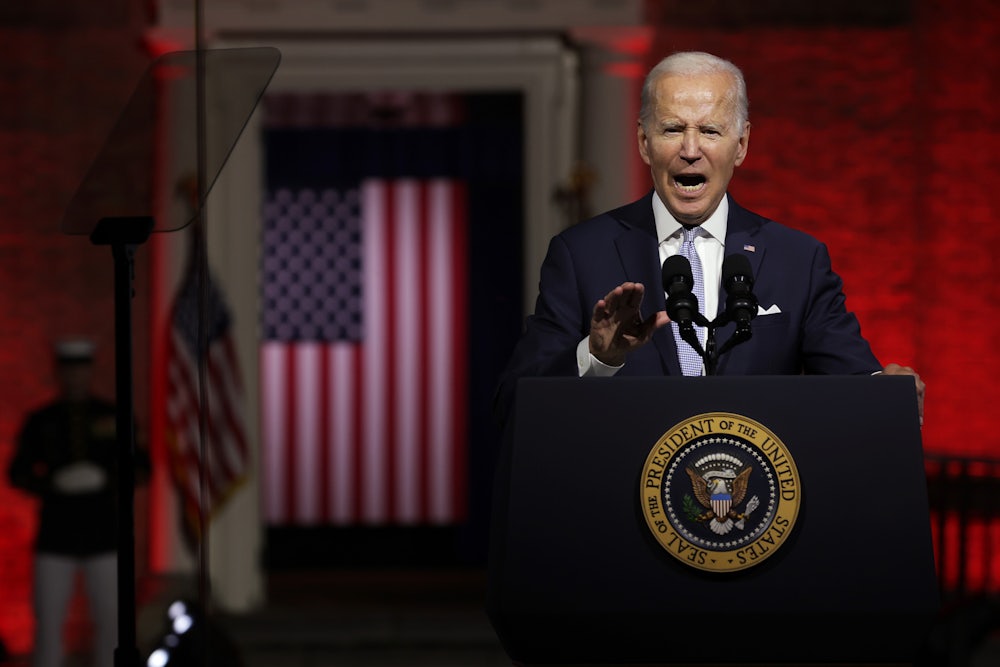Speaking earlier this month in Philadelphia in front of Independence Hall—bathed, cinematically, in blood-red light, so that he could really get the metaphor across—President Joe Biden laid out what he and Democrats hope will be the most important theme of the 2022 midterm elections: that Donald Trump and his allies represent an existential threat to the future of the republic and to democracy itself. “Donald Trump and the MAGA Republicans represent an extremism that threatens the very foundations of our republic,” Biden said, in a speech that mentioned the GOP far more than it did Trump—a major shift in Democratic Party rhetoric, which had previously focused intently on the former president.
“Not every Republican, not even the majority of Republicans, are MAGA Republicans. Not every Republican embraces their extreme ideology,” Biden continued. “But there is no question that the Republican Party today is dominated, driven, and intimidated by Donald Trump and the MAGA Republicans, and that is a threat to this country.” Midterm elections are typically referendums on the party of the president; but Biden and Democrats have thus far managed to flip the script with some success, climbing in the polls as they press the case against Trump and the GOP’s authoritarian turn.
On the economy, however, Democrats have had more trouble crafting their message. In keeping with the party’s recent upward trajectory, economic indicators offer Democrats something to talk about: Wages are way up, and gas prices have been decreasing for months—although they remain significantly higher than they were a year ago. Biden has a terrific case to make that he is the strongest labor president in generations. He has signed two important bills into law: one that provides $1 trillion infrastructure spending and another that funds significant investment in green energy production, among other things. As The New Republic’s Michael Tomasky noted, the Biden administration has begun to “turn 40 years of bad economic conventional wisdom on its head by asserting that the government has a role in structuring markets, promoting growth, and guiding industrial policy.”
These are no mean feats. But Democrats don’t have a perfect case. Inflation remains stubbornly high—despite the aforementioned dip in gas prices—and remains one of voters’ top issues in the midterm elections, a certain bad sign for Democrats. Global markets have been increasingly volatile in recent weeks; as central banks raise interest rates, fears of a recession—and huge increases in unemployment—are rising. Europe’s hilariously named Stoxx 600 index just dipped into bear market territory; the Dow Jones is below 30,000 for the first time since 2020.
It’s no wonder that Politico reported this week that Democrats are anxious about how to talk about the economy: eager about touting their recent string of legislative wins, but worried about seeming blind to voters’ concerns about cost-of-living increases. The answer to the Democrats’ dilemma about how to talk about the economy, however, lies in Biden’s speech in Philadelphia: Press the case against the GOP, by depicting them as being similarly extreme and anti-social on money matters—economic arsonists bent on burning it all down.
As Politico’s Adam Cancryn reported, Democrats are uneasy about their economic message, noting that “there’s still underlying trepidation about trumpeting the state of the economy too loudly, especially with many voters still seeing their expenses eclipse their pay gains.” It’s a sensible worry, one Democrats are right to fret over. Sure, the party doesn’t really deserve blame for the ongoing global rise in prices. Republicans may hammer it over inflation, but they have no idea how to rein it in either. A looming recession and accompanying unemployment would, similarly, be a global phenomenon—it’s hard to see what either party could do about it.
But Democrats would almost certainly be blamed anyway. Them’s the breaks, folks: During economic downturns amid midterm elections, the party in power bears the brunt of the anger and uncertainty. Democrats have a tricky needle to thread—acknowledging the pain rising prices are causing while touting wage gains, low unemployment, and an economy that is more weird than bad. Acknowledging the rise in wages, in particular, is a strong counterargument for Democrats.
But it’s not their strongest. The best economic argument that the Democrats have is not so different from Biden’s contention that Republicans are in thrall to an anti-democratic worldview that extends to economic extremism. Biden has delivered on some populist ideas: substantial wage increases and new social spending; he’s also gone to great pains to bolster the power of labor organizers against some ruthless corporate masters. When in power, Republicans only have one real economic idea: Cut taxes for corporations and the ultrawealthy, cut social services, and sit back while they—and their donors—reap the rewards. Donald Trump’s only meaningful legislative accomplishment as president was a bill that drastically lowered the corporate tax rate. That’s it: The only thing you can reliably count on Republicans to do, put in power, is to cut taxes for the rich. Nothing else.
That’s not a perfect argument, but it’s a succinct one—one likely to get more traction than endlessly hemming and hawing about an economy that is good in some ways and bad in others. Accompanied with an argument about wage gains, it’s even better: Republicans only want to see profits given to investors and executives; Democratic economic policy is more focused on broadly benefiting those who don’t enjoy a plutocratic perch. It also exposes the case against inflation: Republicans are using it as a crutch but have no real plan to fight it—put in power, they would only enact policies that would deflate wage gains without solving the underlying price increases.
Democrats have historically dealt awkwardly with economic arguments made by the GOP, in part because Republicans have been able to maintain the impression that they are broad-based tax-cutters and not simply shoveling wealth in the direction of wealthy elites and fueling the next round of corporate stock buybacks. Part of the awkwardness in finding an economic message is that when Donald Trump and his MAGA allies are in power, they act like bog-standard Republicans, not path-breaking populists. It’s the same old confounding “take them seriously or take them literally” trap. Democrats should slice through this knot rather than attempt to untie it. What Republicans actually do while in power provides the case against them—and what they’ll do is every bit as extreme as anything Biden warned about in Philadelphia.










